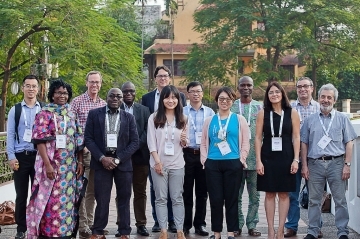Overfishing and depleted fish stocks are the results of open-access conditions where an individual fisher is acting in line with what is best for her personally. However, the joint outcome of all fishers’ actions is that not only do the ecological conditions of the fishery deteriorate, but they also do the economic returns.
From social sciences, we know that in order for fisheries to be sustainable, it has to be well defined who is entitled to fish and who does not have access to a fishery. Fisheries management in developing countries often struggle without access to biological data, and in addition, there is a lack of standardized data collection in economic and social terms as well.
The result is that it is barely possible to evaluate various policy changes and even harder to identify crucial traits that poorly managed fisheries have in common. Our research design entails data collection in all 10 EfD countries where domestic researchers are carrying out the data collection.
Sustainable fisheries and aquaculture management
A similar problem with lack of data also applies to aquaculture in developing countries, despite the fact, that it is a rapidly growing industry that is becoming important as an export earner and provider of domestic high-quality protein in many developing countries.
Sustainable Fisheries Management
The first round of data collection from 10 FPI fisheries will be completed by the end of 2019. The data will be checked for consistency and quality, and the team members will then work on presenting each fishery in a draft article form. The ten fisheries are; Chub and blue mackerel fisheries in China, tuna fisheries in Vietnam, Bombay duck fishery in India, pelagic trawl fishing in Ghana, Tanzanian Nile perch fishery in Lake Victoria, artisanal marine fisheries in Nigeria, small scale Caribbean fisheries in Costa Rica, Queen conch fisheries in the Colombian Caribbean, and pelagic sardine and anchovy fisheries in Chile. These papers will be developed in 2019. They will be presented and revised during a pre-workshop in connection with the EfDs annual meeting in Colombia with the aim of submission to journals by the end of 2019.
Aquaculture Performance Indicator (API) manual development and initial case studies
The core team of researchers at universities in Gothenburg and Gainsville, Florida are working on the design of the manual and survey questionnaire to be used in data collection for Aquaculture Performance Indicators (API). The collaborating EfD researchers that are trained and experienced from using FPI will receive additional training in applying the API based on a selected and surveyed local aquaculture plants. Data will be checked through an iterative process with the program leader and researchers at the University of Florida. Data analysis will focus on identifying and explaining important factors behind success and failure in aquaculture development. The API data will complement other studies in the program that focus on evaluating local policy reforms in a local aquaculture sector. The ultimate aim academically is to produce a high-level science journal article based on the experiences and data gathered during early 2020 to be submitted during 2020.
Our research design entails data collection in China, Vietnam, Chile, Central America, Colombia, Ghana, Nigeria, and Tanzania where domestic researchers are carrying out the data collection.

